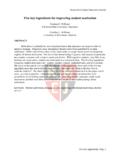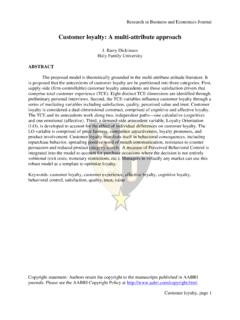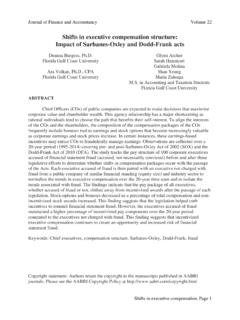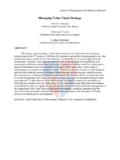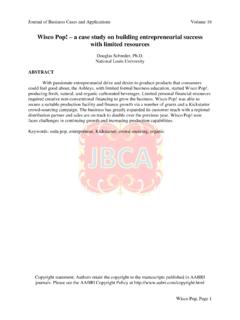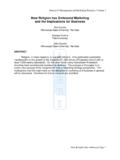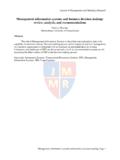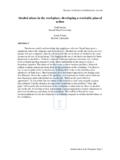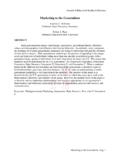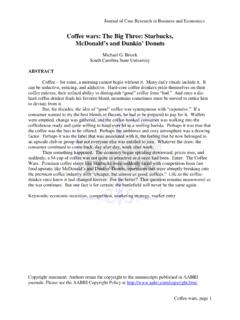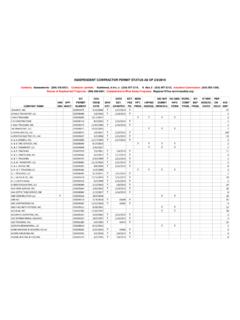Transcription of Analyzing Mutual Fund Performance Against Established ...
1 Research in Business and Economics Journal Analyzing Mutual fund Performance Against Established Performance Benchmarks: A Test of Market Efficiency Theodore Prince Virginia Commonwealth University Frank Bacon Longwood University Abstract The efficient market hypothesis maintains that active investment management is pointless. Rather, an investor is better off deploying a passive investment strategy by utilizing a market index alternative. However, the existence of a significant Mutual fund industry illustrates a belief to the contrary.
2 This paper analyzes the small cap growth stock sector of the Mutual fund industry Against risk-free and market returns over the ten years 1997-2006. Results are tested Against a toolkit of Performance benchmarks to see if expected Performance closely corresponds to the actual results. Development of various Performance benchmarks has allowed investors to quantitatively assess various portfolio alternatives and has Established that diversification can reduce systematic risk. Mutual funds are a way for most investors to achieve these results without the need for expensive research and excessive trading costs.
3 The results indicate that some excess returns have been generated; however, beyond a handful of the funds, it is impossible to rely upon a single benchmark as a reliable indicator of even past Performance . A portfolio approach of combining the benchmarks does not seem to work any better. The evidence tends to support market efficiency since for the most part, the actively managed funds examined in this study produced returns that were largely expected. Keywords: market, efficiency, active, management, Mutual , fund , Performance , benchmarks.
4 Analyzing Mutual fund Performance , Page 1. Introduction Efficient market theory maintains that active investment management is pointless. Rather, an investor is better off deploying a passive investment strategy by utilizing a market index alternative. However, it follows that the existence of a significant Mutual fund industry suggests that an active investment strategy could beat the market . When compared to various Performance benchmarks that allow the necessary diversification to reduce systematic risk, can Mutual fund Performance beat the market ?
5 Do Mutual funds offer an efficient way for most investors to achieve competitive returns and avoid expensive research and excessive trading costs? The purpose of this paper is to test efficient market theory by examining the Performance of Mutual funds. Specifically, the study analyzes the small cap growth stock sector of the Mutual fund industry Against risk-free and market returns over the ten year period 1997-2006. The Mutual fund Performance results will then be further analyzed Against a toolkit of Performance benchmarks to see if the resulting metrics closely correspond to the actual results.
6 Did the actual returns of the sample of actively managed Mutual funds outperform expected risk-adjusted benchmark returns? If so, then efficient market theory is called into question. Literature Review Analysis of Mutual fund Performance is not a new area. Over forty years ago, Sharpe (1966) outlined methodologies to examine Mutual fund Performance within the context of three closely related areas: portfolio, selection, the capital asset pricing model (CAPM), and the general behavior of stock market prices. Portfolio selection theory defines the roles of three market participants: the portfolio analyst, the security analyst, and the investor.
7 Works by Markowitz (1955), Sharpe (1963), and Fama (1965) outline market taxonomy. The portfolio analyst estimates anticipated results through expected portfolio Performance -- and its underlying risk and selects the most efficient portfolio. The security analyst predicts the Performance of individual securities (within the portfolio) including the relationships between different securities. The investor, presented with an array of efficient portfolios must then factor in his risk profile in selecting the portfolio that optimizes the combination of risk and expected returns.
8 Sharpe maintains that the Performance of Mutual funds can vary because of risk. This risk can either be a high-risk strategy that did not succeed; or, just poor execution by the manager (who is both portfolio and security analyst.). CAPM, Sharpe (1964), defines a perfect market whereby participants use information to form their own portfolios -- that incorporate desired returns Against risk. The general behavior of stock market prices concerns the theory of random walks. Fama (1965), which maintains that past Performance of a security prices has no value in predicting its future price.
9 Furthermore, in order to outperform the market, it is necessary to assume greater risk whether by design or by accident. fund Performance analysis by Coggin, Fabozzi and Rahman (1993) also analyzes equity pension fund Performance . They attempt to distinguish Performance between security selection ability and market timing skill. The former employs CAPM methodologies to identify securities that are priced at a premium or a discount to the market. The latter refers to an ability to forecast what the market return will be so that the portfolio's risk levels can be proactively adjusted.
10 Although stocks will offer a higher return than T-Bills over time, the question still remains as to how much. Grinblatt and Titman (1994) outlined several shortcomings in traditional methodologies. The CAPM Performance evaluation is very sensitive to the benchmark selected. Evaluation techniques specifically Jensen's are statistically biased Against successful market timers. Portfolio return analysis is noisy. And, although a portfolio manager of a large fund will create significant wealth, it might not be statistically significant or detectable ( , 2% of a $billion fund .)
